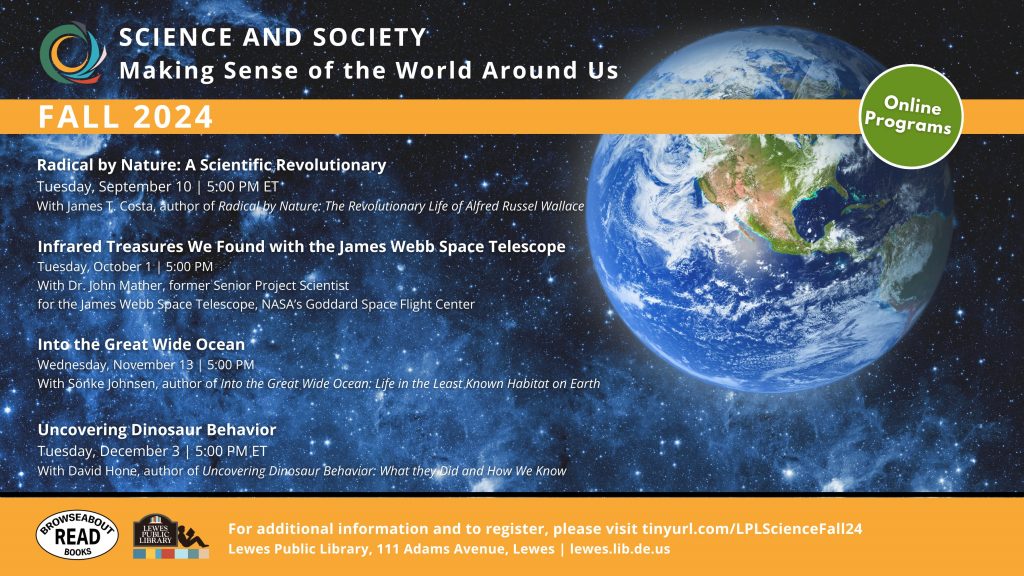Science and Society | Fall 2024

Join us online each month for the library’s “Science and Society – Making Sense of the World Around Us” lecture series. All lectures start at 5:00 PM Eastern Time. You MUST REGISTER to receive instructions for joining the program.
Alfred Russel Wallace, a self-taught scientist from relatively humble origins, became one of the most famed naturalists of the Victorian age. A contemporary of Charles Darwin, he shared in the discovery of natural selection–the key to the concept of evolution–and he made major contributions to natural history, geology, anthropology, climatology, biogeography, and many other fields. An intrepid collector whose expeditions to remote Amazonia and southeast Asia were the stuff of legend, he was also a humanitarian and an advocate for women’s rights and labor reforms—and he was a devotee of spiritualism. Join us for a talk by James T. Costa, whose new book, Radical by Nature: The Revolutionary Life of Alfred Russel Wallace, tells the compelling story of this complex and remarkable scientist who helped shape our understanding of the world we live in.
Dr. Costa is professor of biology and Executive Director of the Highlands Biological Station at Western Carolina University. He is an evolutionary biologist, entomologist, and Darwin and Wallace scholar who has lectured widely in the United States and Europe. He is the author of numerous scientific publications, magazine articles, and nine books, including Radical by Nature, Darwin and the Art of Botany, and an annotated edition of Darwin’s masterwork, On the Origin of Species.
We invite you to support the author by purchasing a copy of their book from Browseabout Books by clicking HERE. Call-in orders are accepted at (302) 226-2665 or you can stop by the store to purchase a copy. For store hours, please visit their website.
The James Webb Space Telescope (JWST) started observations two years ago in July 2022. JWST has stunned astronomers with its discoveries and its gorgeous images. We’ve seen one of the first galaxies to turn on, only 290 million years after the Big Bang. We’ve seen a supermassive black hole, already billions of times the mass of the Sun, just 740 million years after the Bang, and we can’t explain how it grew so big so fast. We’ve seen a dust cloud orbiting a new star, presumably with planets inside. We’ve seen binary Jupiter mass objects in the Orion nebula – so planets don’t always form around stars. We’ve still got the the twin mysteries of dark matter and dark energy and we’ve got a new mystery – we have two ways to measure the expansion rate of the universe, and they don’t agree.
Dr. John Mather was Senior Project Scientist for the James Webb Space Telescope (JWST) at NASA’s Goddard Space Flight Center, leading the science teams from 1995 to 2023. He is now working with teams to conceive hybrid observatories, combining a telescope on the ground with something in space to make it far more powerful. As a postdoc at NASA’s GISS in 1974, he led the proposal efforts for the Cosmic Background Explorer (COBE), whose science lead to the establishment cosmology as a precision science. He shared the Nobel Prize in Physics in 2006 with George Smoot.
In between the shore and the deep sea lies the “pelagic realm”, also known as the “open ocean” – the largest and least known habitat on Earth. This water column is home to many otherworldly creatures, from giant squid to transparent swimming snails. Marine biologist and visual ecologist Dr. Sönke Johnsen, Duke University, will be our guide as he dives into this fascinating but under-discussed world.
Johnsen introduces us to the many strange animals in the pelagic realm, explaining how they handle the challenges presented by their environment. For example: how do they stop themselves from sinking to the bottom of the ocean, despite not having any firm surfaces to stop and rest on? Or how do they deal with the rapidly increasing pressure and the serious lack of light? And, of course, what do they eat, and how do they avoid being eaten? Along the way, Johnsen weaves in personal stories from the field, providing snapshots of what it’s like to be a marine biologist and spend large portions of time on ships in the middle of the ocean, where even the best laid plans are at the mercy of an unruly sea. He compares the way animals survive in the ocean to what humans must do to stay afloat (figuratively and sometimes literally).
Sönke Johnsen is professor of biology at Duke University and author of a new book, Into the Great Wide Ocean: Life in the Least Known Habitat on Earth as well as three other books. Originally trained in mathematics and art, he has studied camouflage, signaling, and non-human visual abilities for the last 34 years with particular interest in vision and camouflage in the open ocean. He primarily works on open-ocean research cruises that using SCUBA and deep-sea submersibles.
We invite you to support the author by purchasing a copy of their book from Browseabout Books by clicking HERE. Call-in orders are accepted at (302) 226-2665 or you can stop by the store to purchase a copy. For store hours, please visit their website.
Dinosaurs were among the more successful animals in Earth’s history, with some 1500 species stretching over 170 million years. But because they became extinct more than 65 million years ago, our understanding of their behaviors—from feeding and communication to reproduction, sociality, and combat—has been based on limited information from the fossil record. Now, a wealth of new specimens and cutting-edge techniques are shedding new light on how dinosaurs lived and interacted. Dinosaur expert David Hone, author of a new book, Uncovering Dinosaur Behavior: What they Did and How We Know, will guide us through this emerging field of prehistoric animal behavior and discuss recent insights from these studies.
Dr. Hone is Reader in Zoology at Queen Mary University of London. He is the author of more than 100 scientific papers on dinosaur biology and behavior and several books, including a series for children. He has also written for leading publications including National Geographic and The Guardian, appeared on many TV and radio broadcasts, and is the host of the podcast Terrible Lizards.
We invite you to support the author by purchasing a copy of their book from Browseabout Books by clicking HERE. Call-in orders are accepted at (302) 226-2665 or you can stop by the store to purchase a copy. For store hours, please visit their website.
Online sessions are conducted through Zoom. If you have problems registering for an event or don’t receive the meeting instructions, please email us. Here are basic written instructions for using Zoom as well as a brief video tutorial. Closed captioning is available for all our sessions. Information on enabling closed captioning in Zoom may be found here.
These talks are co-organized and moderated by Fred Dylla, Executive Director Emeritus of the American Institute of Physics and author of Scientific Journeys, Linda Dylla, former public information officer at the Jefferson Laboratory and the U.S. Department of Energy, and Colin Norman, the former News Editor at Science.





